PENGUIN

CLASSICS
CATULLUS
ADVISORY EDITOR: BETTY RADICE
Of the few facts known about the life of G AIUS V ALERIUS C ATULLUS even the dates of birth and death are uncertain, but he was probably born in 84 B.C. The son of a wealthy citizen of Verona, either he or his family owned a villa on Lake Garda, but in Poem 68 he describes Rome as his home and says that his life was passed there. He writes as a friend of Cicero and other leading figures and appears as a leader of the new movement in poetry and a lover of the notorious Clodia Metelli, who was probably the Lesbia of the poems. In 57 he travelled as one of C. Memmius Gemelluss suite to Bithynia, where he visited his brothers grave. , his work was all but lost for a thousand years. , his work was all but lost for a thousand years.
P ETER W HIGHAM was self-educated and, since his first job as a gardener in the Wye Valley, had been successively a schoolmaster, an actor in provincial repertory, a reporter for a mid-Wales newspaper, a schoolmaster again, and a free-lance script writer for the B.B.C. In the early sixties he moved to Italy to devote himself entirely to writing. Largely as a result of his Catullus translations he was invited to give courses in verse composition at the University of California, where he stayed for two years. Until his death in 1987, he lived in the East bay area of San Francisco. His other publications include The Blue Winged Bee (Poetry Book Society Choice for Spring 1969) and ASTAPOVO or What We Are To Do , both from Anvil Press Poetry, London.
CATULLUS
The Poems
Translated with an Introduction by
PETER WHIGHAM
PENGUIN BOOKS PENGUIN BOOKS Published by the Penguin Group
Penguin Books Ltd, 80 Strand, London WC2R 0RL , England
Penguin Group (USA) Inc., 375 Hudson Street, New York, New York 10014, USA
Penguin Books Australia Ltd, 250 Camberwell Road, Camberwell, Victoria 3124, Australia
Penguin Books Canada Ltd, 10 Alcorn Avenue, Toronto, Ontario, Canada M4Y 3B2
Penguin Books India (P) Ltd. 11 Community Centre, Panchsheel Park, New Delhi 110017, India
Penguin Group (NZ), cnr Airborne and Rosedale Roads, Albany, Auckland 1310, New Zealand
Penguin Books (South Africa) (Pty) Ltd, 24 Sturdee Avenue, Rosebank 2196, South Africa Penguin Books Ltd, Registered Offices: 80 Strand, London WC2R 0RL , England www.penguin.com First published 1966
Published in Penguin Books 1966
Reissued under the present title 2004
1 This translation and introduction copyright Peter Whigham, 1966
All rights reserved Except in the United States of America, this book is sold subject to the condition that it shall not, by way of trade or otherwise, be lent, re-sold, hired out, or otherwise circulated without the publishers prior consent in any form of binding or cover other than that in which it is published and without a similar condition including this condition being imposed on the subsequent purchaser 978-0-14-193749-6 TO THE MEMORY OF
WILLIAM CARLOS WILLIAMS
CONTENTS
ACKNOWLEDGEMENTS
S OME of the poems originally appeared in Artisan, The National Review, Agenda and Arion , to whose editors I am indebted for permission to reprint them. 11 Community Centre, Panchsheel Park, New Delhi 110017, India
Penguin Group (NZ), cnr Airborne and Rosedale Roads, Albany, Auckland 1310, New Zealand
Penguin Books (South Africa) (Pty) Ltd, 24 Sturdee Avenue, Rosebank 2196, South Africa Penguin Books Ltd, Registered Offices: 80 Strand, London WC2R 0RL , England www.penguin.com First published 1966
Published in Penguin Books 1966
Reissued under the present title 2004
1 This translation and introduction copyright Peter Whigham, 1966
All rights reserved Except in the United States of America, this book is sold subject to the condition that it shall not, by way of trade or otherwise, be lent, re-sold, hired out, or otherwise circulated without the publishers prior consent in any form of binding or cover other than that in which it is published and without a similar condition including this condition being imposed on the subsequent purchaser 978-0-14-193749-6 TO THE MEMORY OF
WILLIAM CARLOS WILLIAMS
CONTENTS
ACKNOWLEDGEMENTS
S OME of the poems originally appeared in Artisan, The National Review, Agenda and Arion , to whose editors I am indebted for permission to reprint them.
Some also appeared in Clear Lake Comes from Enjoyment , Neville Spearman, 1959. Poem 61 was first printed in The Marriage Rite , The Ditchling Press, 1960. Both these books were written in collaboration with Denis Goacher. In the specialised field of Catullan studies my debts are too widespread and diverse to be easily enumerated here. I can only hope that the book itself may in some sort prove a recompense for what I have pillaged from those more learned than myself. Unfortunately, C.J.
Fordyces Catullus (1961) did not appear until my work was more than half completed, but I have made what use of it I could. Burton and Smithers curious but stimulating volume has been with me from the time when I began to make my first versions. Munros Criticisms and Elucidations of Catullus (1878) and Robinson Elliss Oxford Text, together with his Commentary on Catullus (2nd edn., 1889), have been my principal guides textually and exegetically. I have also used the texts of S. G. P. P.
Postgate (1889). Muellers text (1885) is of course incorporated in the Burton and Smithers volume. Salvatore Quasimodos selected translation and Carlo Saggios complete one have been an invaluable stimulus. I have also been helped by Ferreros two studies (both Turin, 1955) and, perhaps most of all, by Noels two-volume work: Catulle (An. XI 1803), a fund of Renaissance and post-Renaissance lore on the subject of Catullus. 1893) in particular, I have derived valuable, if somewhat idiosyncratic, insights. 1893) in particular, I have derived valuable, if somewhat idiosyncratic, insights.
Finally, there has been my old edition (1797) of Lemprire, and Carnevales Roma Nel III Secolo (1896). A year or so before his death, William Carlos Williams had some of these poems read to him. He handed them around among his friends. Not only his example as a poet but this practical encouragement of his as a master was a great help to me at a time when the book might well have been left in an incomplete state: hoc tibi, quod potui, confectum carmine munus/ pro multis, Alli, redditur officiis . Wine stains the verse;
the curse of time obliterates the arrogant line. Then, in Verona, Campesani knows
the Roman hand:
One woman could command
this song.
He sang
and fourteen hundred years
later, it reappears
in the barrels bung
(the hand that Campesani knows)
codex from wine-bung springing,
as from the dung
the rose.
INTRODUCTION
W E know very little about Catulluss life: even the dates of his birth and death are uncertain. The likeliest figures are: born 84, died 54 B.C. His full name was Gaius Valerius Catullus. His father was a citizen of Verona and apparently of sufficient eminence to entertain Julius Caesar in his house. Either Catullus, or his family, owned a villa on the Sirmio peninsula on Lake Garda, about thirty miles west of Verona. We do not know where Catullus had his schooling, nor anything about his family, except that he had a brother who died before him.
In poem 68 he tells us that already, at the age of 15 or 16, he had had his first experiences of love and, by implication, of poetry. In the same poem he describes Rome as his home and says that his life is passed there. We do not know when he left Verona, nor when he arrived in Rome nor where he lived when he was there. He speaks of a villa near Tivoli, but he must have had a town house as well. He constantly complains of being short of money, although he never seems wholly serious about this. He writes as a friend of Cicero and of many of the most distinguished figures of his day.

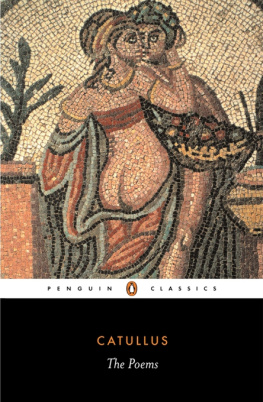
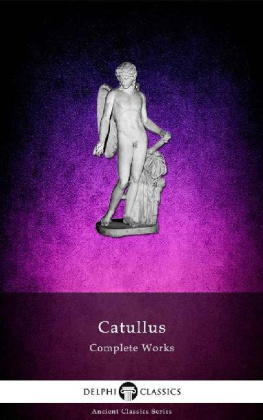
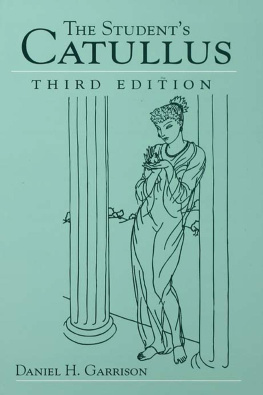
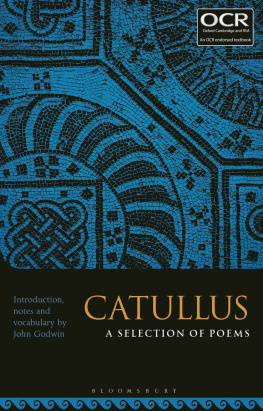

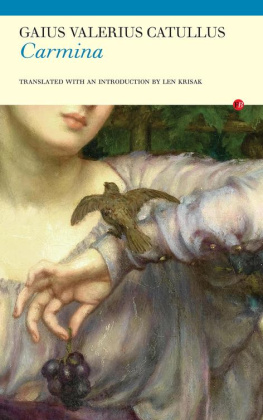
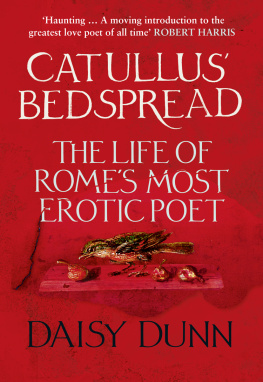
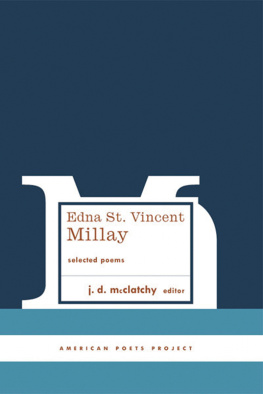
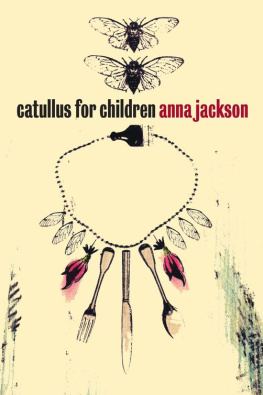
 CLASSICS
CLASSICS